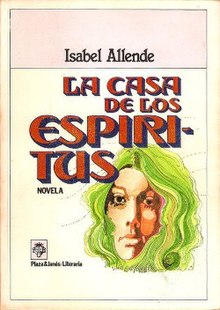The House of the Spirits

First edition
|
|
| Author | Isabel Allende |
|---|---|
| Original title | La casa de los espíritus |
| Translator | Magda Bogin |
| Cover artist | Jordi Sánchez |
| Country | Chile |
| Language | Spanish |
| Genre | Autobiographical novel, Magical realism |
| Publisher | Plaza & Janés, S.A. (Spain) Alfred A. Knopf (U.S.) Bantam (US) |
|
Publication date
|
1982 |
| Media type | Print (Hardback & Paperback) |
| OCLC | 25823349 |
The House of the Spirits (Spanish: La casa de los espíritus, 1982) is the debut novel of Isabel Allende. The novel was rejected by several Spanish-language publishers before being published in Buenos Aires in 1982. It became an instant best seller, was critically acclaimed, and catapulted Allende to literary stardom. The novel was named Best Novel of the Year in Chile in 1982, and Allende received the country's Panorama Literario award.The House of the Spirits has been translated into over 37 languages.
The book was first conceived by Allende when she received news that her 100-year-old grandfather was dying. She began to write him a letter that ultimately became the manuscript of The House of the Spirits.
The story details the life of the Trueba family, spanning four generations, and tracing the post-colonial social and political upheavals of Chile – though the country's name, and the names of figures closely paralleling historical ones, such as "the President" or "the Poet", are never explicitly given. The story is told mainly from the perspective of two protagonists (Esteban and Alba) and incorporates elements of magical realism.
The story starts with the del Valle family, focusing upon the youngest and the oldest daughters of the family, Clara and Rosa. The youngest daughter, Clara del Valle, has paranormal powers and keeps a detailed diary of her life. Using her powers, Clara predicts an accidental death in the family. Shortly after this, Clara's sister, Rosa the Beautiful, is killed by poison intended for her father who is running for the Senate. Rosa's fiancé, a poor miner named Esteban Trueba, is devastated and attempts to mend his broken heart by devoting his life to uplifting his family hacienda, Las Tres Marías. Through a combination of intimidation and reward systems, he quickly earns/forces respect and labor from the fearful peasants and turns Tres Marías into a "model hacienda". He turns the first peasant who spoke to him upon arrival, Pedro Segundo, into his foreman, who quickly becomes the closest thing that Trueba ever has to an actual friend during his life. However, he rapes many of the peasant women, and his first victim, Pancha García, becomes the mother of his bastard son, who would eventually give birth to Esteban García.
Esteban returns to the city to see his dying mother. After her death, Esteban decides to fulfill her dying wish: for him to marry and have legitimate children. He goes to the del Valle family to ask for Clara's hand in marriage. Clara accepts Esteban's proposal; she herself has predicted her engagement two months prior, speaking for the first time in nine years. During the period of their engagement, Esteban builds what everyone calls "the big house on the corner," a large mansion in the city where the Trueba family will live for generations. After their wedding, Esteban's sister Férula comes to live with the newlyweds in the big house on the corner. Férula develops a strong dedication to Clara, which fulfills her need to serve others. However, Esteban's wild desire to possess Clara and to monopolize her love causes him to throw Férula out of the house. She curses him, telling him that he will shrink in body and soul, and die like a dog. Although she misses her sister-in-law, a passive and dreamy Clara finds happiness in developing her psychic powers. Spirits, artists, and spiritualists flock to the Truebas' house.
...
Wikipedia
